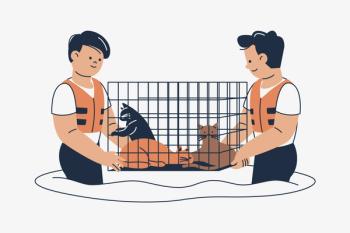
- dvm360 September 2019
- Volume 50
- Issue 9
Horrible Hundred identifies problem puppy mills, calls on USDA to enforce penalties
After a routine veterinary check, the Humane Society has released their latest report, listing puppy mills and dog sellers for consumers to be wary of and government agencies to act on.
Cedar Ridge Australians, also known as AussieDoodleWoods, located in Alton, Missouri, is one of several repeat offenders on the Horrible Hundred list.
The Humane Society of the United States (HSUS) recently published a list of one hundred problem puppy mills and dog sellers. Dubbed ‘
Since last year, some of the dealers listed in the 2018 report appear to have closed their doors, while others have been penalized by the state, but appear to still be operating. “A few of the dealers listed have been shut down by local authorities or were urged to close voluntarily, due to ongoing and uncorrected violations,” says Kitty Block, president and CEO of the HSUS, in an interview with dvm360. “A few others have cleaned up their facilities to acceptable levels due to the increased scrutiny.”
Violations include dogs found shivering in the cold, dogs with only frozen water buckets available or no water at all, dogs with untreated wounds, sick puppies who had not been treated by a veterinarian and underweight dogs with their ribs and spines showing. Twenty-seven of the dealers in the 2019 report
“Private practice veterinary professionals often see the devastating impact of sick puppies brought home by unsuspecting consumers,” Block says in the interview. “Many did not know their puppy came from a puppy mill, but they quickly learned the truth when faced with middle-of-the-night emergency veterinary visits, and hundreds or even thousands of dollars in veterinary bills. It can put veterinarians in the position of having to explain to an owner that the dog they purchased isn't as healthy as they were told, or worse, that the dog isn't able to be saved. In a field already fraught with compassion fatigue, circumstances like this only exacerbate the situation.”
Missouri has the largest number of puppy mills in the Horrible Hundred for the seventh year in a row, followed by Iowa, Pennsylvania and Ohio. It's important to note, however, that HSUS researchers are unable to get local inspection records from states that don't have kennel inspection laws, so states that have solid kennel inspection programs often have more dealers in the report. In contrast, states such as Arkansas, Florida, North Carolina and Tennessee don't inspect dog breeding kennels at all, and therefore have few to no dealers in the report simply because documentation is scant.
Over the past two years, there appears to have been a steep decline in mill enforcement by the USDA. The Washington Post
Another photo taken from AussieDoodleWoods in Alton, Missouri. According to the report, state inspectors have repeatedly found underweight or injured dogs at the operation, including a dog with bite wounds.
Also of concern is the USDA-launched
In response, the USDA submitted this statement in an email release: “We are dedicated to conducting quality inspections and providing assistance to facilities with compliance challenges,” said USDA spokesperson Andre Bell. “In FY 2017, USDA conducted 2,727 inspections of breeding facilities and found that 97 percent of them were in substantial compliance with the Animal Welfare Act (AWA) requirements.”
In 2017, the USDA redacted breeder names, kennel names and license numbers from most of the public inspection records available online. HSUS researchers continued publishing the Horrible Hundred report using state inspection records to identify many of the problem dealers and breeders so that consumers could access the information. The HSUS is currently in an ongoing legislative battle with the USDA to get those redactions removed under Freedom of Information Act requests on these reports.
The Humane Society Veterinary Medical Association (HSVMA), a HSUS affiliate, recently submitted a letter to the USDA with 272 signatures from veterinary professionals. The letter is in support of a proposed USDA rule that, if finalized, could prevent federally licensed pet breeders with conditions that violate basic standards of care, or those who have had their licenses previously revoked, from obtaining a new license. The rule would also require licensed facilities to provide annual hands-on professional veterinary care for each dog, along with continual access to water. The letter noted that the proposed provisions are common sense from a veterinary perspective.
Block says that the letter also urged the USDA to make the rule stronger by banning certain hallmarks of puppy mills-such as stacked cages and wire floors-and requiring dogs to have more space than the tiny cages the USDA currently allows. The proposed rule, which both HSVMA and HSUS are in support of, can be found
“Puppy mills are bad for animals, consumers and veterinarians alike,” said Block in the interview. HSUS is
Kristy Stevenson is an independent contributing writer and editor based in Wake Forest, North Carolina. Her award-winning work has appeared in Military Officer, Geek and other publications. She enjoys travel, scrapbooking and viewing the world through the lens of a Nikon.
Articles in this issue
over 6 years ago
dvm360, VHMA announce practice manager contest finalistsover 6 years ago
Storm Sangria: A calming cocktail for noise-phobic dogsover 6 years ago
Walk softly and carry a big net: The global fight against rabiesover 6 years ago
A veterinary way with wordsover 6 years ago
Insurance wont cover a DCM diagnosis?over 6 years ago
Cowboy hats and CPR: Why human medicine ain't my rodeoover 6 years ago
Letter to dvm360: Better drug control helpsover 6 years ago
Trupanion wants to save six acres of treesNewsletter
From exam room tips to practice management insights, get trusted veterinary news delivered straight to your inbox—subscribe to dvm360.




